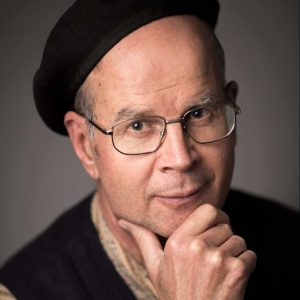Born premature, with a hole in the heart, on 15 October 1954, to Polish-German, delicatessen-running parents in Melbourne, Australia, Peter Bakowski fell in love with the map of the world and reading at an early age. Peter and his wife, Helen, a clothes-maker, travel to Europe annually, particularly Paris and most recently Berlin. 2019 represents Peter’s thirty-sixth year of writing poems. In 2019 Wakefield Press will publish Elsewhere Variations, forty-eight call-and-response poems by Peter Bakowski and Ken Bolton and Recent Works Press will publish Wardrobe of Selves, Peter’s seventh full-length poetry collection.
Denise: What drew you to poetry in the first place, and when did you start writing?
Peter: I started writing poetry in 1983 at a friend’s farmhouse in Waco, Texas. I wrote a poem as a cry-of-the-heart response to receiving a ‘Dear John’ letter while I was on the road, travelling. My response came out as a poem. I was attracted to the taut, direct nature of a poem, rather than blocks of prose, perhaps prone to over-description or a convoluted plot.
Denise: Which poets have influenced you and your work the most?
Peter: Contemporary North American poets have influenced me the most – initially Charles Bukowski’s poetry showed me that you could write about the urban and the local, that you could be plain-speaking. From Bukowski I went on to discover Raymond Carver, Ted Kooser, Billy Collins and Charles Simic, whose poetry is infused with Eastern European sensibility and black humour. I’m also influenced by Wislawa Szymborska, Tadeusz Rozewicz and Ramon Gomez de la Serna – all these poets I consider plain-speaking but able to authoritatively Include insight, humour and surrealism in their poems.
Denise: What is your main inspiration for writing?
Peter: No matter how many books I write in my lifetime, they’ll all be about what it’s like to be a human being. Given this, I continue to write a spectrum of portrait poems of real and fictitious individuals, to reveal the creative and destructive, the vulnerable and the tenacious, often occurring simultaneously, ‘at war’ in the individual portrayed. I’m also drawn to cities. I like to be a poet-detective in a city, noting people in parks, cafes, the commuter rush.
Denise: When you’ve finished a poem, what is your editing and reviewing process?
Peter: I edit a poem by looking at the poem and asking myself, ‘What am I trying to say in this poem and have I said it clearly and strongly?’ I also review whether the poem has an engine, a momentum to it and also whether it’s skeletal or even stillborn. As I work towards a poetry collection I print out my accumulation of poems, lay them out on the living room floor and look at whether any of the poems are passengers. Each poem has to do some work, earn their place and keep. I tell every budding, emerging poet to send their poems to magazines. The actual process of submitting poems often makes me re-look at the poems and often fine-tune them, iron out any wrinkles or anything superfluous.
Denise: Do you have a particular writing routine? How do you balance work and personal time?
Peter: I am continuously ‘nourishing’ myself as a writer by walking, by reading and by thinking – thinking about people and life – Why are we here? What is our purpose? Is there an afterlife? etc.
Denise: What are you currently reading?
Peter: I’m currently reading a biography of Diane Arbus which I will follow by reading biographies of Vivian Maier, Robert Frank and Richard Avedon, as I want to write one or several poems about a real or fictionalised photographer.
Denise: Among the many countries in which you’ve spent time, which have influenced you the most?
Peter : Although I was born and largely live in Melbourne, Australia, I feel somewhat North Hemispherian. In the 1980s I hitch-hiked several thousand miles through the US and Canada, caught a freight train across Montana, lived in a cave on Isla Mujeres, Mexico and travelled through Egypt, Sudan and Central African Republic. I feel I’m a tidal, fluctuating mongrel mix of European and Australian – at times melancholic, at times laconic, capable of a philosophical shrug and an absurdist laugh.
Denise: What role do you feel poetry plays in our society, and what if anything about that role would you change?
Peter: I’ve found that the French revere poetry and I’ve had a very heartening response to my poetry in France, critically and from library audiences.
Denise: What advice would you offer to aspiring poets out there?
Peter: Send your poems out to magazines and journals, read other writers, other poets. Go out your front door. Observe. Digest. Think. Be positive when you face the blank page – you have a vocabulary, life experience. Face the blank page, calm but open, even though the subject matter may be personal – the world needs honest writing about what it has been like/is like to be you. Don’t use abstractions in your writing. Be alert to the world and write about the real without dilution or cosmeticising. Keep self-pity and complaint and rant out of the poem. Find out if you’ve got the will, the drive to be a writer.

